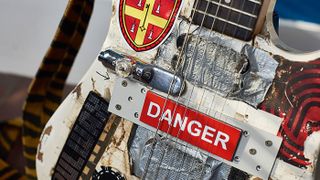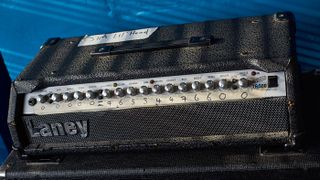Enter the wonderful world of a British alt-rock hero Jamie Lenman as he fires up the riffs for a new album, Devolver...
Unsung, underrated, unappreciated, underdog… read about the 10-year life of UK rock trio Reuben and their songwriting maverick Jamie Lenman and you’ll find these negative cliches come up a lot. The feeling of missed chances and injustices for an alternative rock band that made three excellent albums full of riffs, invention and disarming honesty before their 2008 split.
They should have broken through... But forget all that. None of those negative connotations fit Lenman’s piledriver of a new solo album Devolver. Or, indeed, the impeccably dressed Jamie Lenman who graciously hosts us in his wonderfully Victorian and sci-fi appointed home in Surrey with tea, custard creams and beautifully battered gear.
Instead, we find a lot is happening in his world, and we’ll soon get to understand why he’s still a player who deserves good things to happen. On that note, he’s even held his own festival, Lenmania, championing new music.
“I don’t feel like an underdog at all,” he tells us as we sit down at his dining table. “I’m still trying to gain ground and increase my audience, I feel like a fresh new thing.” And we reckon he’s only just getting started…
Devolution
On your first solo album, Muscle Memory, you separated the extremes of your sound into heavy and acoustic discs, does Devolver feel like you’re in more of your natural musical state?
“I called it Devolver because in approaching it I thought it was maybe a devolution in the sound, I was sort of going backwards in combining the two again. But at the same time there’s elements I haven’t done before. So it’s not quite going back to what I used to do, or my natural state; maybe it is but slightly augmented as we have a lot more danceable elements in there. Samples and synths - they don’t take it over but I’m using them more than I used to... but, broadly, yes.”
Did that double album challenge you as a player?
“Hugely. First of all I had to do a banjo solo on one side. When I used to do solos it was in a kind of Kurt Cobain style, just follow the melody line or make a weird noise, not really a solo but an interlude. I was never any good at soloing, I can’t shred.
“Someone like Simon Neil can really go for it, or Iain D’Sa from Billy Talent is another guitarist I really admire. But I started to do things on the banjo and on the banjolele that you’d call solos that were quite difficult. But equally on the more heavy side of the record, some of the more thrash stuff that moved towards djent was challenging on the guitar.”
Have you always written ahead of your ability in that sense, where your technique is almost catching your ideas up?
In Nothing We Trust is my favourite Reuben record. Because you can hear us straining at our own abilities
“I try to, those are my favourite records when I’ve done that. I just did a bunch of publicity for the re-release of the last Reuben album [In Nothing We Trust] and you can hear that we’re not as good as that record. And I enjoyed that, which is why it’s my favourite Reuben record. Because you can hear us straining at our own abilities, which is where I think musicians should be. I find it quite exciting when people fall off the cliff a bit. I like there to be areas like that on all the records I do.
“As far as technical ability that was certainly the case with Muscle Memory, but on this one, not so much. I think, vocally, I’ve pushed myself into areas I haven’t been before. If I’m honest, the guitar parts weren’t quite as taxing. Musically, it’s a lot more streamlined. Although I did do a trumpet solo! That was right on the edge of my ability. It only just made it. And there’s a big old guitar solo on that same song - and I think you can hear whoever is playing that is no Brian May, but I’m trying.”
Which musicians did you look up to when you first started playing?

“I listened to The Beatles and I liked them, but I didn’t really get into them until I was 16/17. So they didn’t inform my musical journey. It was Freddie and Brian. I’ve said a couple of times that really what I wanted to be was a combination of Freddie and Brian… but it didn’t really work out. I’ve got the moustache and I’ve got the yellow jacket as well, though.
“Then later on it was Kurt, Dave and Krist. Because in that band those personalities all shine through. I think most people can name the members of Queen and Nirvana because of the personalities. Kurt and Dave were big heroes because I played the drums as well, not as good as Dave and I don’t sing as well as Kurt but it certainly informed what I was doing.
“If you listen to bands like Queen, in every song there’s a ripping guitar solo. Which I was aiming at when I was young but I had to admit to myself after a few years that I didn’t have enough raw talent to develop it to a shred status. Then when I heard Green Day and Nirvana I thought, ‘You can make great songs and you don’t need a solo.’ I latched on to that grunge sensibility and that punk, three-chords, anyone can [approach], which is worlds away from the seven-minute operas Queen would do. I found myself somewhere in the middle.”

Rhythmic relationship
You mentioned playing the drums; how do you think that can inform guitar playing - the relationship between rhythm and the kinds of parts you write?
Space knows exactly what I’m talking about when I say, ‘Let’s have a little bit of that from this record’
“I usually, but not always, start with the drums and the drum pattern. Rhythms interest and excite me. I feel bad because I’m talking to a guitar magazine but I prefer playing the drums to playing guitar. Maybe because guitar is my day job so when I get to play drums it’s more fun for me.
“Plus, I’m so much less experienced and always learning on drums. Whereas I think I may have plateaued on the guitar a bit. So I’ll often start with the drums and build the guitar around that. I did that with one of the Reuben singles, Stuck In My Throat, which I only wrote because the drummer kept playing this paradiddle exercise and I thought if I write a song around that, he’ll stop playing it. And he did. Then we released the song as a single. Now I have to deal with my own self. I write the beat first; normally but not always.”
Mississippi is an example of a song on the new album that sounds very much beat-driven - it feels like a Trent Reznor approach.
“That influence, the Nine Inch Nail sound, actually came much later for me. They’re so broad and unique, that really they’re their own genre. That influence has always been there for me but this time it really came out because of things like the emphasis on percussion, but also my producer on this record, Space [Paul Frazer]. He’s very influenced by Nine Inch Nails.
“Whenever I’ve worked with other producers in the past, Nine Inch Nails were a bit of a footnote [to them] but in Reuben, Jon [Pearce, bass] and Guy [Davis, drums] loved them as well so we wanted to put more of that in the music. But it never really connected with the producers, whereas Space knows exactly what I’m talking about when I say, ‘Let’s have a little bit of that from this record.’ You’ve got that real harsh, overdriven drum sound. I was over the moon with how that sounded.”
The way you’ve integrated electronics on Devolver is interesting because it’s quite subtle, and it actually enhances the guitars. Did the second opinion of a producer help with that?
“I would come to Space and say, ‘We need a synth here’, but all my ideas are very unsubtle so the last track, Devolver, the choruses have big synths and it ends with a big wash of synths. That was me listening to a lot of the early Cyndi Lauper records and Phil Collins’ first three records and hearing the power of that.
We used synth to infuse the record with that slightly fatter sound so you don’t always notice it but it is there
“But then, equally, Space would suggest a song that I hadn’t even considered needed any synths, like Personal or Hell In A Fast Car, sometimes even without me knowing he would put a synth line mirroring the guitar. It sounds great and there’s even some in Mississippi as well.
“We used it to infuse the record with that slightly fatter sound so you don’t always notice it but it is there. It’s like when Basquiat would paint a message on his paintings and paint over it. So even though you can’t see it you know it’s still there… maybe that’s a metaphor too far. Basically, all the subtle bits where it works are Space and all the really outrageous bits are my fault!”

Patting the head
One thing that’s always struck us about you as a vocalist/guitarist is that you don’t make life easy for yourself. How did you build that patting head/rubbing tummy skill? Was it the need to deliver what you were writing?
“I’m glad you noticed that, because it was fucking difficult! [laughs]. I don’t think I’ve ever dumbed down anything I’ve written to fit my abilities. I’ve always gone, ‘That’s what it is’ and had to reach out to it. With varying levels of success, and I’m even proud of those failures, I think even those are valid. You just have to dive into it and it progresses. Things like One Of My Eyes Is A Clock on the last record, even now it fills me with dread playing that. My drummer more so. But we’ll get there.
“You’re exactly right with the patting head/rubbing tummy thing, but that is what you’re doing when you’re playing the drums anyway. If you’re playing the guitar, your left and right hand are mostly in sync because you’re hitting where your fingers are. But if you’re playing the drums, all four of your limbs can be doing a different rhythm at any given time.
If you are going to repeat a section, you should make an effort to change it up
“Sometimes cross [poly] rhythms, that I’m very interested in, like with three against four. So perhaps, and I’m only thinking about this for the first time since you asked me about it, maybe that feeds into it because when I play the drums I’m playing a lot of cross rhythms and interesting stuff. And even a simple drum beat involves your four limbs doing something separate. So maybe that skill feeds into it.”
Even back in Reuben you were evolving guitar parts through songs rather than repeating. Has that always been a conscious move to keep things interesting for yourself and the listener?
“I’m very flattered that you’ve noticed that because I did put a lot of effort into that and I still do. Quite apart from anything else it helps when you’re mixing because you can say, ‘No, that’s verse two - listen to the guitar!’ It seems crazy to me, I understand people want to go verse, chorus, verse, chorus and I’ve written a lot of linear songs and songs that don’t repeat any section once. But the way we tend to write songs is if we like a melody or a section and we want to hear it again. But if you are going to do that, you should make an effort to change it up.
“And some people will sing the same words over verse two! And sometimes that can be quite animalistic. If you listen to The Stooges, it’s about raw power and it’s a rightbrain thing. But it doesn’t take much effort to elevate it from that; change the guitar up or the instrumentation slightly to keep it interesting.”
Jamie's essential gear
Yamaha RGX

Jamie got his Yamaha RGX when he was working in a music shop [a job referenced in the band’s song Good Luck] around the time Reuben were starting with an approach inspired by the melodic drop D riffage of Helmet, Kerbdog and Silverchair. It’s been his main guitar ever since and although it’s held together by metal plates, he hasn’t been able to find one the same since.
You take that top string and you feed it to the POG, which sends it down an octave, you put it through a bass cab
It's since been modded with an ingenuously simple solution that allows Jamie to play the role of guitarist and bassist live.
“It’s a passive pickup made by a guy in Bristol called the Submarine. And the idea is that it picks up one or two of your strings and in all his demonstration videos he shows it being used on the thinnest strings. I thought, ‘That’s nice but surely there’s another use you’re not showing here.’ So I got hold of one and couldn’t believe no one had done this before. So I put it on the bottom string, the thickest string, because most of what I play, the bass and guitar follow each other anyway.

“I just need to do whatever that one hand is doing. So you take that top string and you feed it to the [Electro-Harmonix] POG, which sends it down an octave, you put it through a bass cab and it sounds exactly like a bass.
“People do ask when they come to the shows, ‘Are you looping it? Are you playing to a backing track? Do you have a bass player behind the stage?’ I’m chuffed people think I’m cheating! But it’s all live.”
Laney Tube Fusion FX

The Tube Fusion series launched in the early 90s, and this battered but essential mainstay was obtained by Jamie through the same music shop job. The series combined solid-state power amplification with valve pre-amplification.
Jamie’s model was originally a practice combo that was converted by a tech into a head after its speaker blew.
“A lot of the amps people would give me from Laney and Marshall, they were just a little bit thin or a bit flubby,” explains Jamie. “Somehow it has weight and it has bite. It cuts through and if you have new strings on the guitar and you plug in through that amp it just sounds incredible.”
Devolver is out now on Big Scary Monsters.





